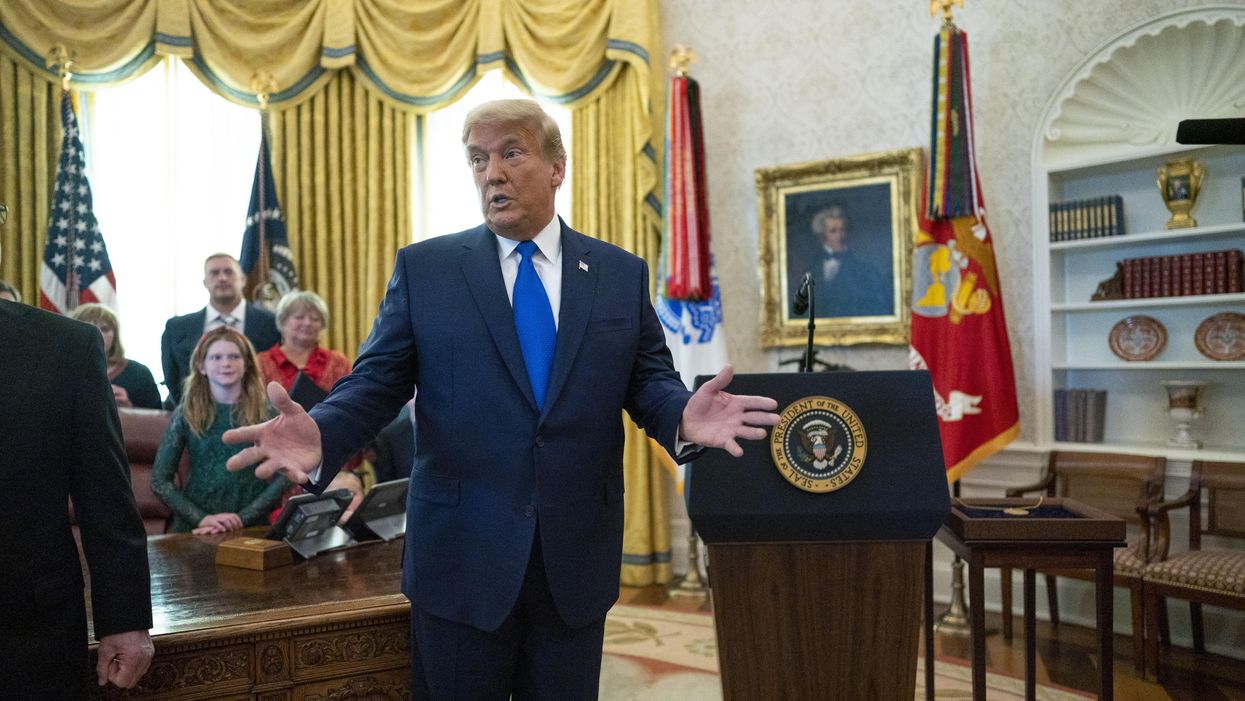Midnight marks a milestone in the tortured path that the election has been made to follow by President Trump's baseless campaign to debase democracy.
No matter how much legal spaghetti Trump and his allies throw at the wall — and there was a fresh batch Tuesday morning involving four states — none of it has a realistic chance to stick once the so-called safe harbor deadline passes in a few hours.
At that point, Joe Biden will cross one of the final formal thresholds before assuming the presidency, and the success of his final steps are supposed to be legally guaranteed and the American electoral system itself will be on the cusp of surviving one of its most extraordinary stress tests.
The safe harbor provision amounts to the payoff on an insurance policy when the states do what they're supposed to do. They get to put a shield around the people they are sending to the Electoral College so long as they meet the deadline for certifying their results and those results have withstood all legal challenges until the deadline passes.
By the end of the day every state is expected to have made the deadline. The next step is the electors meet across the country Monday to cast their votes: Biden has earned 306, three dozen more than the majority required, leaving Trump with a legitimate claim to just 232.
Under the law, written after the contested election of 1876, when Congress meets three weeks later to tabulate the votes it must accept as "conclusive" those 51 slates of electors and their ballots if there's no viable outstanding litigation. That means Trump's legal challenges have even less hope of changing the outcome than they have had so far.
And if there is only one slate of electors from a state, Congress must accept its votes — unless the Democratic-majority House (and the Senate) votes to reject them, which will not happen.
Any such challenge must be made by both a House and Senate member. Even if that happens, each chamber would then meet to resolve the objection and it would almost certainly fail, said Alexander Keyssar, a professor at the Harvard Kennedy School, who has studied the Electoral College.
Trump maintains he is being robbed of re-election by massive fraud the nation has yet to come to appreciate. His lawyers have offered a catalogue of claims, including conspiracy theories about voting machines being hacked by several countries.
But his campaign and his Republcian allies have been stymied so far in almost 50 lawsuits, mainly in battleground states he lost, and most of them quickly falling short for a total lack of evidence exposing irregularities. His side has triumphed just once — in a case involving bureaucratic authority, not malfeasance, that curbed Biden's margin in Pennsylvania by about 2,000 votes.
On Tuesday, Texas Attorney General Ken Paxton, one of Trump's most vocal allies, announced one of the most ambitious claims yet. He said he had gone straight to the Supreme Court to allege that four battlegrounds where Biden got 62 electoral votes — Georgia, Michigan, Pennsylvania and Wisconsin — had made unlawful changes to their election procedures in response to the coronavirus pandemic.
By failing to do enough to to protect their newly more lenient vote-by-mail systems from fraud, Texas alleged, the four states had diminished "the weight of votes cast in states that lawfully abide by the election structure set forth in the Constitution" and so their electoral votes should not count.
The court is not obligated to hear the case and precedent demands its original jurisdiction over fights among states should be applied rarely. But if the court fails to act before the electors vote, "a grave cloud will hang over not only the presidency but also the republic," Paxton said.
Attorney General Dana Nessel of Michigan called the lawsuit "a publicity stunt, not a serious legal pleading." Attorney General Josh Shapiro of Pennsylvania, like Nessel a Democrat, said, "These continued attacks on our fair and free election system are beyond meritless, beyond reckless."
The high court has given Republicans in Pennsylvania until later in the day to make their best case about why all the absentee ballots in the states should be disallowed — even though the top court in the state has upheld the law setting out the rules for mail-in voting.
Two Trump campaign lawsuits in federal court, seeking to block Biden's wins in Michigan and Georgia, were effectively dismissed Monday.
But in Wisconsin, the campaign refiled an already-rejected complaint in state court on Monday over vote tallies in heavily Democratic Madison and Milwaukee. A hearing is scheduled for later this week, meaning that state could be the one to miss the safe harbor deadline.
But that would not deprive Wisconsin of its 10 electoral votes. Biden electors still will meet in Madison on Monday to cast their votes and there's no reason to expect a politically divided Congress would spurn them.
One House Republican, Mo Brooks of Alabama, says he will challenge electoral votes for Biden on Jan. 6. His effort would need at least one senator's support to get off the ground, and then the House and Senate — the latter probably with a GOP majority because votes from the day before in Georgia's two Senate races may still be getting counted — would debate the objections and vote on whether to sustain them.
The safe harbor law played a crucial role after the 2000 presidential election. The Supreme Court shut down Florida's recount hours before the deadline, cutting off Vice President Al Gore's avenue to carry the state and thereby win the presidency. He conceded to Gov. George W. Bush of Texas the next day.




















Trump & Hegseth gave Mark Kelly a huge 2028 gift